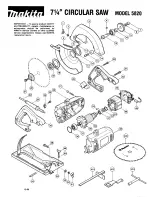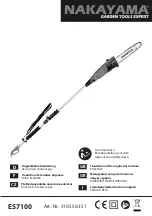
44
44
XVI
English
WARNING Read all safety warnings, instructions,
illustrations and specifications provided with this power tool.
Failure to follow the warnings and instructions may result in electric
shock, fire and/or serious injury.
Save all warnings and instructions for future reference.
SAFETY INSTRUCTIONS FOR TABLE SAWS
1) Guarding related warnings
a)
Keep guards in place. Guards must be in working order
and be properly mounted.
A guard that is loose, damaged, or is
not functioning correctly must be repaired or replaced.
b)
Always use saw blade guard, riving knife and anti-
kickback device for every through–cutting operation.
For
through-cutting operations where the saw blade cuts completely
through the thickness of the workpiece, the guard and other safety
devices help reduce the risk of injury.
c)
Immediately reattach the guarding system after
completing an operation (such as rabbeting) which requires
removal of the guard, riving knife and/or anti-kickback
device.
The guard, riving knife, and anti-kickback device help to
reduce the risk of injury.
d)
Make sure the saw blade is not contacting the guard,
riving knife or the workpiece before the switch is turned
on.
Inadvertent contact of these items with the saw blade could
cause a hazardous condition.
e)
Adjust the riving knife as described in this instruction
manual.
Incorrect spacing, positioning and alignment can make
the riving knife ineffective in reducing the likelihood of kickback.
f)
For the riving knife and anti-kickback device to work,
they must be engaged in the workpiece.
The riving knife and
anti-kickback device are ineffective when cutting workpieces that
are too short to be engaged with the riving knife and anti-kickback
device. Under these conditions a kickback cannot be prevented by
the riving knife and antikickback device.
g)
Use the appropriate saw blade for the riving knife.
For
the riving knife to function properly, the saw blade diameter must
match the appropriate riving knife and the body of the saw blade
must be thinner than the thickness of the riving knife and the
cutting width of the saw blade must be wider than the thickness of
the riving knife.
2) Cutting procedures warnings
a)
DANGER: Never place your fingers or hands in the
vicinity or in line with the saw blade.
A moment of inattention
or a slip could direct your hand towards the saw blade and result in
serious personal injury.
b)
Feed the workpiece into the saw blade only against the
direction of rotation.
Feeding the workpiece in the same direc-
tion that the saw blade is rotating above the table may result in the
workpiece, and your hand, being pulled into the saw blade.
c)
Never use the mitre gauge to feed the workpiece when
ripping and do not use the rip fence as a length stop when
cross cutting with the mitre gauge.
Guiding the workpiece
with the rip fence and the mitre gauge at the same time increases
the likelihood of saw blade binding and kickback.
d)
When ripping, always apply the workpiece feeding force
between the fence and the saw blade. Use a push stick
when the distance between the fence and the saw blade is
less than 150 mm, and use a push block when this distance
is less than 50 mm.
“Work helping” devices will keep your hand
at a safe distance from the saw blade.
e)
Use only the push stick provided by the manufacturer or
constructed in accordance with the instructions.
This push
stick provides sufficient distance of the hand from the saw blade.
f)
Never use a damaged or cut push stick.
A damaged push
stick may break causing your hand to slip into the saw blade.
g)
Do not perform any operation “freehand”. Always use
either the rip fence or the mitre gauge to position and
guide the workpiece.
“Freehand” means using your hands to
support or guide the workpiece, in lieu of a rip fence or mitre gauge.
Freehand sawing leads to misalignment, binding and kickback.
h)
Never reach around or over a rotating saw blade.
Reaching for a workpiece may lead to accidental contact with the
moving saw blade.
i)
Provide auxiliary workpiece support to the rear and/or
sides of the saw table for long and/or wide workpieces to
keep them level.
A long and/or wide workpiece has a tendency to
pivot on the table’s edge, causing loss of control, saw blade binding
and kickback.
j)
Feed workpiece at an even pace. Do not bend or twist the
workpiece. If jamming occurs, turn the tool off immedia-
tely, unplug the tool then clear the jam.
Jamming the saw
blade by the workpiece can cause kickback or stall the motor.
k)
Do not remove pieces of cut-off material while the saw is
running.
The material may become trapped between the fence or
inside the saw blade guard and the saw blade pulling your fingers
into the saw blade. Turn the saw off and wait until the saw blade
stops before removing material.
l)
Use an auxiliary fence in contact with the table top when
ripping workpieces less than 2 mm thick.
A thin workpiece
may wedge under the rip fence and create a kickback.
3) Kickback causes and related warnings
Kickback is a sudden reaction of the workpiece due to a pinched,
jammed saw blade or misaligned line of cut in the workpiece with
respect to the saw blade or when a part of the workpiece binds
between the saw blade and the rip fence or other fixed object.
Most frequently during kickback, the workpiece is lifted from the
table by the rear portion of the saw blade and is propelled towards
the operator.
Kickback is the result of saw misuse and/or incorrect operating
procedures or conditions and can be avoided by taking proper
precautions as given below.
a)
Never stand directly in line with the saw blade. Always
position your body on the same side of the saw blade as the
fence.
Kickback may propel the workpiece at high velocity towards
anyone standing in front and in line with the saw blade.
b)
Never reach over or in back of the saw blade to pull or to
support the workpiece.
Accidental contact with the saw blade
may occur or kickback may drag your fingers into the saw blade.
c)
Never hold and press the workpiece that is being cut off
against the rotating saw blade.
Pressing the workpiece being
cut off against the saw blade will create a binding condition and
kickback.
Summary of Contents for 4933464225
Page 1: ...Original instructions M18 FTS210 ...
Page 4: ...2 2 I 20 kg 44 lbs Not included in standard equipment 28 mm 4x ...
Page 5: ...3 3 I ...
Page 6: ...4 4 II 2 1 3 ...
Page 7: ...5 5 II 4 5 7 8 6 2 EN 847 1 2 1 1 ...
Page 8: ...6 6 8 9 10 11 1 2 3 8 mm II ...
Page 9: ...7 7 III 0 45 max 63 5 mm max 44 mm ...
Page 11: ...9 9 1 IV 5 25 15 35 45 10 30 40 20 0 2 1 3 ...
Page 12: ...10 10 IV 4 mm 0 3 47 45 4 mm 3 0 45 47 ...
Page 13: ...11 11 V 2 1 3 ...
Page 16: ...14 14 V 1 2 3 ...
Page 17: ...15 15 V 4 A 4 B 6 19 mm ...
Page 18: ...16 16 V 4 C 6 mm ...
Page 19: ...17 17 VI 30 90 45 75 60 60 75 45 30 1 2 3 4 ...
Page 20: ...18 18 A AS 2 250 4931 4472 95 B AS300 AS 30 AS 42 4931 4472 94 VII 1 2 ...
Page 21: ...19 19 VIII Carry out a test cut ...
Page 22: ...20 20 VIII 305 mm 31 5 mm 6 mm 3 mm 63 mm 19 mm 100 mm 70 ...
Page 23: ...21 21 VIII ...
Page 24: ...22 22 VIII ...
Page 25: ...23 23 VIII ...
Page 26: ...24 24 IX 1 2 3 3 8 mm ...
Page 27: ...25 25 IX 1 2 3 ...
Page 28: ...26 26 X 1 2 1 2 ...
Page 29: ...27 27 X TIP 78 100 33 54 55 77 10 32 10 ...
Page 30: ...28 28 XI Start Stop ...
Page 31: ...29 29 XI 2 1 1 2 ...
Page 32: ...30 30 XI 10min 4 3 ...
Page 33: ...31 31 XI 1 2 3 4 ...
Page 34: ...32 32 XI 1 3 2 4 mm 4 mm ...
Page 35: ...33 33 XII 4 4 2 3 1 1 1 2 2 ...
Page 36: ...34 34 XII 4 6 7 5 1 2 EN 847 1 ...
Page 37: ...35 35 89 30 90 00 0 90 XIII ...
Page 38: ...36 36 89 30 90 00 90 XIII ...
Page 40: ...38 38 XIII 2 5 mm ...
Page 41: ...39 39 XIII 5 mm ...
Page 42: ...40 40 XIII 4 mm 4 mm 2 5 mm 89 30 90 00 ...
Page 43: ...41 41 XIV 1 2 3 3V CR2032 ...
Page 44: ...42 42 XV ...





































